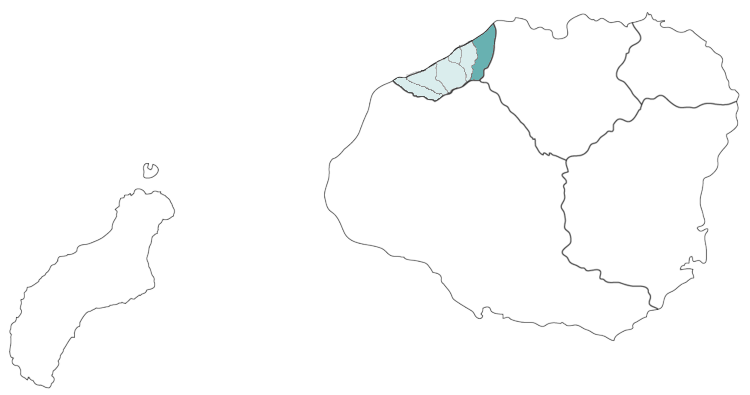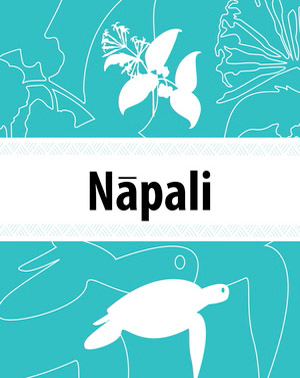
Hanakāpi‘ai: Name of a Menehune chiefess
Hanakāpi‘ai is one of the seven ahupua‘a of the Nāpali district. This valley was well populated. There were extensive irrigation systems and house sites in the valley. [Bennett] [PEM] [Kelsey]
It was named after a chiefess who died in childbirth on the edge of the cliffs as the Menehune were on their way to Hā‘ena to leave Kaua‘i. Those who do not know this attempt to translate the name as "Bay sprinkling food." No one knows what the Menehune meaning would be.
Hana-kā-pi‘ai was famed for its ‘o‘opu peke, a dwarf ‘o‘opu (the goby fish, Sicopterus stimpsoni) named nōpili. It was one of the ‘ai-lehua, lehua flower eating goby, which can climb up a vertical stone jar or wall by slightly moving its suction disk, first on one side, then on the other. It was said to pili, cling, to stones and was used in weaning and housewarming ceremonies so that luck would pili, cling. The largest nōpili were found in the Wainiha, Hanalei and Makaweli rivers, but the Hana-kā-pi‘ai nōpili were thicker and shorter.
A fat woman was compared to the nōpili. So was a short penis, which was also referred to as an ‘o‘opu peke or pokole.
In the 1930s fishermen from Hā‘ena and Wainiha would row in a six oar rowboat to Kalalau to catch moi. One time, when a man who wore wide-legged palaka shorts leaned back on a pull of his oar, his penis stuck out. Another fisherman grabbed it and yelled, "I caught a nōpili!" All the men laughed so much, one of them fell overboard. The fish smelled and heard him and swam away, so the fishermen had to row home again empty-handed. But they thought the joke was worth the trip. [Hashimoto]
Evidently the people of Hanakāpi‘ai endured quite a bit of teasing for they coined a boast:
Ka iki koai‘e a Hana-kā-pi‘ai
The small koai‘e tree of Hanakāpi‘ai
One may be of small size but nonetheless is as tough and sturdy as a koai‘e tree, which was prized for its hard wood. (Pukui 1399)
An alternative spelling of the ahupua‘a is Hana-ka-pī‘ei, which can be translated as Constantly looking out to protect a love affair. Pī‘ei is a rare Kaua‘i version of kī‘ei, meaning "to peer through a door or crevice. No Hawaiian could resist the pun and created this story: a certain chiefess named Honokoa liked to "make trouble" with a handsome chief named Waiehu. They met in a cave in the valley thinking themselves secure from prying eyes but brought attention upon themselves by constantly peeking out to see if they were observed. [Kelsey] [I]
PEM translates the name as bay sprinkling food and also spells the name as Hanakāpī‘ai. The macron over the i is incorrect; see the entry pi‘ai in PE and Pukui‘s ‘ōlelo No‘eau.
